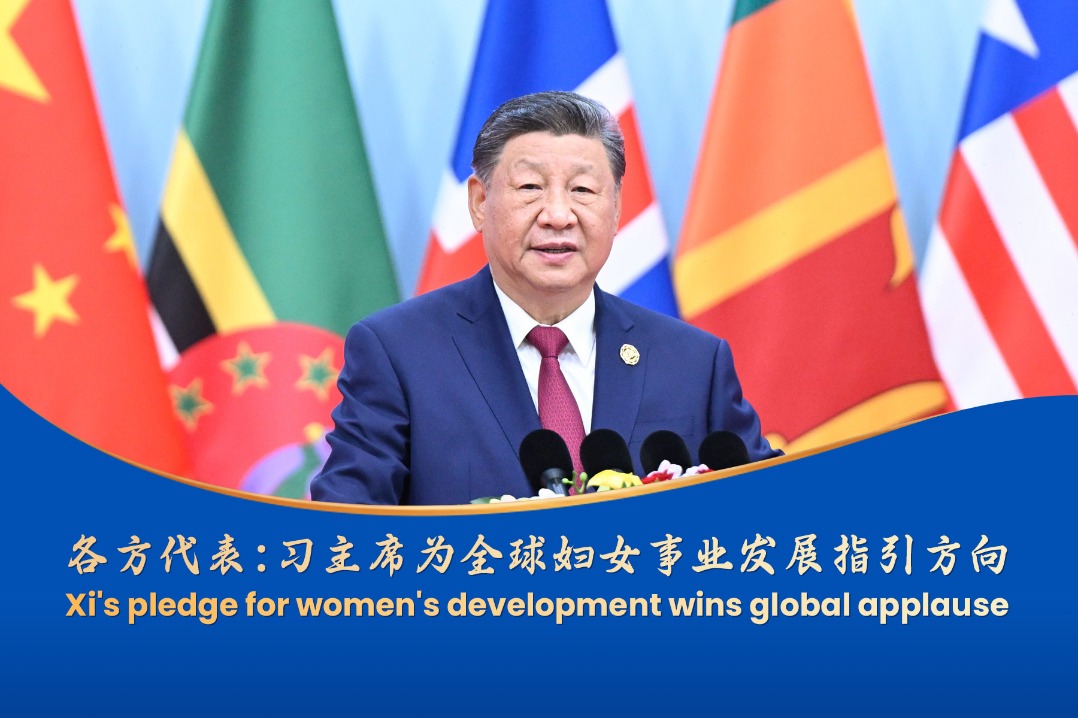Strategic mythmaking


LI MIN/CHINA DAILY
In absence of a genuinely bipolar world, Western fabrication of Cold War binaries is a revival of racial hierarchies in the form of the 'barbaric East' versus 'civilized West'
Editor's note: The world has undergone many changes and shocks in recent years. Enhanced dialogue between scholars from China and overseas is needed to build mutual understanding on many problems the world faces. For this purpose, the China Watch Institute of China Daily and the National Institute for Global Strategy, Chinese Academy of Social Sciences, jointly present this special column: The Global Strategic Dialogue, in which experts from China and abroad will offer insightful views, analysis and fresh perspectives on long-term strategic issues of global importance.
World War II was not merely a contest of geopolitics on an unprecedented scale; it constituted a moral confrontation — a clash between incompatible visions of humanity. The victors articulated a commitment to principles of liberty, human dignity and equality, in opposition to the virulently racist and eliminationist ideologies of fascism and militarism that had sought to reorder the global hierarchy on racial lines.
The Cold War that followed, though driven by strategic rivalry, was also deeply moralized. A worldview was epitomized to contrast liberal democracy with so-called totalitarianism. Yet, even during this intense ideological confrontation, Western discourse generally avoided essentializing the Russian or broader Slavic identity.
In contrast, the geopolitical climate following the outbreak of the Ukraine crisis in 2022 has witnessed the re-emergence — albeit in veiled and modernized forms — of racialized discourses reminiscent of interwar ideologies. While justified on the grounds of opposition to regional conflicts and in defense of international law, segments of Western strategic thought have come to portray not merely the Russian state, but the Russian people and culture writ large, as antithetical to civilization itself. This essentialism marks a departure from the strategic rationalism of the original Cold War and introduces troubling echoes of past racial hierarchies.
However, the deeper concern lies not in Russia per se, but in the reactivation of exclusionary and civilizational frameworks within the Western strategic imagination. Narratives that elevate the threat of "barbaric East" versus "civilized West" are not only analytically flawed, but also geopolitically reckless. These tropes are increasingly projected onto other non-Western powers, especially China, whose growing role in international affairs has revealed the inadequacy of the binary logic of Cold War revivalism.
China's position as a globally integrated, economically powerful and diplomatically assertive state renders itself far more consequential in shaping the contours of the emerging world order. Crucially, China has not adopted a revisionist posture grounded in racialized exceptionalism. Rather, its foreign policy — anchored in discourses such as the Global Civilization Initiative and the community with a shared future for humanity — offers a vision of multipolar coexistence. It resists Manichaean binaries and advocates a civilizational pluralism that stands in contrast to the West's increasingly moralized and homogenizing strategic language.
This alternative provides a conceptual framework, through which the international system might resist a relapse into ideologically charged blocs reminiscent of the 20th century's darkest moments. Indeed, China's advocacy for non-alignment, noninterference and mutual development aligns more closely with the post-colonial aspirations of other Global South countries.
The current Western strategic climate has become especially prone to mythmaking and historical distortion. One of the most frequently invoked parallels is that of the 1938 Munich Agreement, employed to warn the risk of maintaining a mild policy and justify a hawkish stance against contemporary adversaries. Yet this analogy elides significant historical and strategic distinctions.
Assertions that today's geopolitical major powers — especially China — are poised to emulate the expansionism of the past are false and alarmist. In the case of China, it prioritizes economic entanglement and infrastructure diplomacy over military adventurism.
Furthermore, the Western revival of Cold War binaries in the absence of a genuinely bipolar world risks distorting the actual dynamics of global power. China's ascent represents a fundamentally different phenomenon — one that cannot be adequately addressed through recycled containment strategies. The risk lies in the increasing fusion of Western strategic narratives with Western civilizational essentialism, which treats China not merely as a rival but as a cultural "other" — a tendency amplified by certain Western think tanks and political elites.
Moreover, this tendency mirrors past racialized discourses that divided the world into "civilized" and "barbaric" domains, legitimizing coercive interventions under the guise of moral clarity. The specter of such logic returning in contemporary policy is particularly troubling in this age, where misunderstandings and dehumanizing rhetoric can have catastrophic consequences.
To guard against such outcomes, it is imperative to cultivate an international discourse grounded in pluralism, historical consciousness and strategic realism. China's role in this regard is significant — because it presents a powerful counternarrative to the homogenizing moralism that currently permeates parts of Western strategic thinking. Its call for a multipolar and culturally diverse international system offers a potential safeguard against the ideological absolutism and racialized antagonisms that once led the world to ruin.
Eighty years after the end of World War II and the defeat of Nazism and its associated racial ideologies, the West now risks entrapping humanity in a new Cold War. Against this backdrop, China offers an alternative vision: a world in which inevitable geopolitical rivalries are moderated by a broader understanding of shared humanity, a constructive view of other nations and peoples, intercultural cooperation and — above all — a realistic reading of global affairs grounded in the recognition that humanity shares a common destiny. That destiny may well be imperiled if we allow ourselves to be drawn once again into an intolerant and adversarial geopolitical bipolarity.
The author is professor of geopolitics and modern weapons technologies and head of the Department of Theory and Analysis of War at the Hellenic Military Academy. The author contributed this article to China Watch, a think tank powered by China Daily.
The views do not necessarily reflect those of China Daily.
Contact the editor at editor@chinawatch.cn.


































